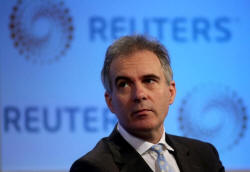|
BoE's Broadbent says
would back further cut in rates
 Send a link to a friend
Send a link to a friend
 [August 05, 2016]
By David Milliken [August 05, 2016]
By David Milliken
LONDON (Reuters) - Bank of England Deputy
Governor Ben Broadbent said on Friday he would support cutting interest
rates again this year, but ruled out using a new bank funding scheme to
bring in negative rates by the back door.
Broadbent said he was closely watching the labor market to gauge the hit
to demand in Britain's economy from June's vote to leave the European
Union, and highlighted a survey released overnight that showed the
biggest fall in jobs since 2009.
"We expected to vote to cut interest rates again were the economy to
unfold in line with forecasts, and yes, I was one of those," Broadbent
said in an interview at the Bank of England, which was also attended by
two other news organizations.
The deputy governor, who serves on the BoE's rate-setting Monetary
Policy Committee, said the Bank still had plenty of options to stimulate
the economy after cutting rates for the first time since 2009 and
resuming quantitative easing.
As well as a rate cut to just above zero, Broadbent said the BoE could
increase the target for government bond holdings before it completed the
60 billion pounds of purchases it announced on Thursday, which are
scheduled to take six months.
The BoE has also started to buy corporate bonds in big quantities for
the first time, and Broadbent did not rule out purchases of funds
holding company shares in future, though it is not something the MPC has
considered yet.

"I do think it is a material risk but it is not qualitatively something
we haven't done before. You would have to think through it very
seriously, but that is a matter for the MPC and I am not in a position
to give a steer on it one way or another," he said.
The BoE's new Term Funding Scheme (TFS) - unlike 2012's Funding for
Lending Scheme - was not aimed at boosting lending but instead at
ensuring lenders passed on the latest cut in interest rates, Broadbent
said.
"It's not really the supply of credit that is the constraint on the
economy," he said. "In truth we didn't expect much loan growth and nor
did we expect some even if we offered more concessions for it."
[to top of second column] |

Deputy Governor of the Bank of England Ben Broadbent listens to a
question during a Reuters Newsmaker event at Canary Wharf in London,
Britain November 18, 2015. REUTERS/Neil Hall

The TFS - which makes up to 100 billion pounds of newly created central bank
funds available at around the BoE's new Bank Rate of 0.25 percent - would need
to be retooled if the central bank cut rates closer to zero, he added.
But Broadbent said the BoE would not use it as a back-door way to introduce
negative interest rates - something some analysts had speculated about, given
Governor Mark Carney's firm opposition to cutting Bank Rate below zero.
"There are limits for us too. We would not want to offer that finance at hugely
negative interest rates, because we would be making losses ourselves," he said.
Neither conventional fiscal policy nor monetary policy could fully offset the
hit Britain was likely to suffer as a result of leaving the EU, he said.
"There are limits to what monetary policy - indeed any demand management policy
- conventional fiscal policy as well, to offset what is a structural effect on
the economy," he said.
(Editing by Andy Bruce)
[© 2016 Thomson Reuters. All rights
reserved.] Copyright 2016 Reuters. All rights reserved. This material may not be published,
broadcast, rewritten or redistributed.
 \ \
 |